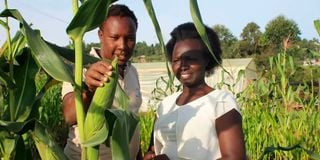Couple makes case for organic farming

Hosea Kiplagat and his wife Rose on their organic farm in Kabarnet, Baringo County.
Some three kilometres from Kabarnet town in Baringo County, one finds the Cereals Farm.
The two-acre farm, named after the National Cereal and Produce Board stores located in the area, hosts dairy cows, goats and chickens in the livestock section.
The crop farm, on the other hand, is teeming with green maize, a variety of vegetables and fodder crops such as sorghum.
Hosea Kiplagat, the owner, runs the farm with his wife, Rose, employing a variety of permaculture and organic farming methods to produce quality food.
The couple set up the farm in 2019 to produce healthy and safe food to meet growing demand in Kabarnet town.
They started with vegetables such as collard greens, spinach, leeks and coriander.
“I decided to set up this farm because I wanted to produce organic food for family,” says Kiplagat, who holds a Masters in Finance from KCA University and works as a project coordinator with an NGO.
With time, they had surplus and sold it in the neighbourhood, making an average profit of over Sh25,000 a month.

Rose Kiplagat with the family’s goats on their farm in Baringo.
The couple decided to turn the venture into a business, largely growing the crops using the manure from their daily cattle and goats.
Besides spinach and collard, they also farm traditional vegetables like nightshade, amaranth and spider plant.
"We have also set up a fruit forest where we farm various fruits," says Rose, a primary school teacher.
The fruit forest hosts oranges, strawberries, guavas, lemons, pawpaws, custard apples, apples, grapes, kiwi, jack fruits, mangoes, passion fruits and tree tomatoes.
“The investment in the farm has been gradual and progressive. We started with training on permaculture which helped us identify what to grow and how to farm it. The kitchen garden cost us Sh20,000 while fencing Sh60,000,” says Rose, adding the fruit forest cost them over Sh20,000.
From five cows, three Ayrshires and two Friesians, we get manure and some 20 litres of milk from two that we are milking.

Hosea Kiplagat at his organic farm in Kabarnet, Baringo County.
To ensure they have quality manure, the couple use red worms to breakdown the product as well as food and crop waste.
The worms feed on the organic waste converting it into vermicompost, a rich organic fertiliser.
To control pests and diseases, they make bio-pesticide from a concoction of chilli, thitonia, neem and some bar soap to make it sticky. The ingredients are crushed, mixed with water and left to settle.
They have intercropped their crops with onions and Mexican marigold to repel destructive pests in the farm.
“This helps to control the pests naturally. The concoction, however, is used to mainly kill soft-bodied insects such as aphids or spider mites. We crush and soak overnight for use as pesticide. After two weeks it’s used as bio-fertiliser,” observes Kiplagat, noting they also grease stems of custard apples, lemon and orange fruit trees to control pests such as ants.
They have employed two workers while they contract casuals on the need basis. The couple has set up ponds on a section of their farm where they grow azolla for use as livestock feed to cut costs.
“We now have four ponds measuring 1.5m wide by 10m long each. We harvest azolla, about 20kg every two days and mix with wheat bran and dairy meal for the cows and goats while the chickens consume it directly,” says Kiplagat, noting they sell the vegetables for an average of Sh70 a kilo, which is higher than Sh50 for inorganic produce.
Kiplagat says they are breeding the Toggenberg dairy goats to increase the number to 40 from five as we aim to produce goat milk yoghurt in the long-term.
Mary Irungu from Participatory Ecological Land Use Management (Pelum), an institution that advocates for organic farming, observes that agro-ecology helps a farmer reduce the cost of production since they use what is locally available such as compost or farmyard manure.
To succeed, she says one should practice diversity where a farmer keeps both livestock and grows crops which helps them to boost their earnings and resilience against climate change.
Dr Nicholas Syano, an agro-ecology and drylands management expert and a lecturer at Machakos University, observes that organic farming guarantees healthy soils, environment and safe food to consumers.
The expert observes that the government should put in place policies to support organic farming, such as training of farmers and having clear certification standards.
“What we also need is to have labelling of food produced if it is organic or inorganic. So that when one goes to a market, it is easier to establish organic from inorganic produce,” he adds.





